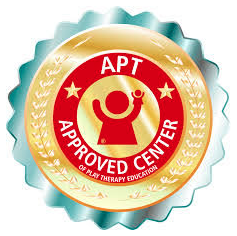Certificate in Play Therapy FAQ
Frequently asked questions about Antioch University Seattle’s play therapy certificate program
Antioch University Seattle’s play therapy certificate program has been developed to meet the academic requirements to achieve a Registered Play Therapist designation through the Association for Play Therapy, upon completion of your respective WA state License of LMFT or LMHC. This is a unique program to encourage the growth of Play Therapists in our region and community. Play therapy has been demonstrated to be one of the most effective therapies for children and families needing support and skills to process their life events in a safe, structured and healthy environment.
How long is the program, and how many credits are these classes worth?
- The program is 3 credits a quarter (a total of 12 credits over 4 terms).
- Length of Program: approximately one year
- Seminar Schedule: 3 weekends per quarter on weeks 2, 6, & 10
- Classes are held on Saturdays and Sundays due to the fact that many students are gaining their internship (or associate-post grad) hours.
- Curriculum
- Spring: Introduction to Play Therapy
- Summer: Advanced Play Therapy
- Fall: Seminar in Play Therapy I
- Winter: Seminar in Play Therapy II
What about the course-load? Is it "manageable" when I am interning prior to graduation and/or gaining my associate's hours (post-grad) toward licensure?
I have been told from current students that the course load is reasonable and standard for a 3-credit course, in terms of reading and writing. The classes are highly experiential and require client (or other willing participants) taped sessions (with informed consent, of course) in some of the classes to demonstrate active learning and application of the techniques. Therefore, completing this certificate program while doing internship is ideal! I think it is a do-able amount of work while completing your internship.
How many classes should I take per term and how do I fit the play therapy classes into my schedule, so I’m not overwhelmed?
[response from current student] “I used one of the certification classes toward my Family Practice Series Elective (CFT), and another for my General Elective—the other two were paid out-of-pocket. I was sure to plan my classes (for registration purposes) to accommodate for the weekend Play Therapy courses. This strategy assisted in preventing overwhelming responsibilities (e.g., assignments from writing-intense classes) from impacting essential reading and study time for Play Therapy.” “Since starting the certificate program, I have been enrolled in two other classes—including internship. This arrangement truly depends on your flexibility, and commitments. The most time consuming assignment is the final paper, which requires me at least a full weekend to complete–not including the preparation (i.e., video recording, paperwork).”
Can I just take one of the courses as an elective if I am a CPT student?
Yes, you may take only the Introduction to Play Therapy course. As this program is sequential, classes must be taken in a specific order (if you are in the cohort track). However, preference will be given to cohort members (not guaranteed admission).
Are the courses similar to other classes at Antioch?
[response from current student] “I noticed the material becoming more salient weeks following the first Introduction to Play Therapy class. Some of the concepts (e.g., lifecycle development, attunement, counseling children) are consistent with required CFT courses, however, are exhaustively covered in Cary’s instruction. Overall, the Play Therapy certificate program has benefited my practice in internship, and paved the path I now look forward to pursuing following graduation.”
What are the benefits of becoming certified in play therapy, in your opinion?
There are many benefits of the play therapy program! First and foremost, play therapy meets children where they are at developmentally and therefore is beneficial for children, adolescents, and families with a myriad of diagnostic challenges and presentations. It is very comprehensive, and this modality is becoming a prominent therapy throughout the nation. However, if students are not interested in working with this population, the program may not fit their needs.
What are the requirements to become a Registered Play Therapist (RPT) (APT website, 2015)?
Visit the following link to learn more about the requirements to becoming a Registered Play Therapist (RPT) via The Accrediting Body of The Association for Play Therapy: https://www.a4pt.org/page/CredentialsHomepage
What about supervision toward my RPT hours? When does this occur?
In WA state, students can only get supervision upon graduation, when they are gaining their associate hours toward licensure. RPT specific supervision is provided through RPT-S like myself, Cary Hamilton, and is independent of the play therapy concentration track at Antioch.
Can I call myself a play-therapist once I start these classes?
No! Only once you have been certified by the National Association for Play Therapy (a4pt.org) and you gain your RPT Provider # can you be called a “play therapist.” After taking this APT Approved certificate program, you will have almost all your Continuing Education requirements to be designated as an RPT. Once you have gained all your contact hours (e.g., LMHC hours and RPT hours concurrently), and are applying for licensure, you can also apply to become a registered play therapist (therefore, you will have this designation along with your licensed mental health counselor or MFT license). Finally, as this program is APT-Approved and conducted in a University setting, students (graduate or post-graduate) can earn their CE hours faster than attending conferences/workshops to gain this play therapy specific education.
What if I already graduated, or are attending a different Masters program in the area?
This program is open to all graduate students and post-graduates! For those of you who are interested in the concentration but may be working full-time, we have done our best to accommodate everyone by allocating classes to full day weekend schedules (weeks 2, 6, 10). Additionally, the experiential component integrates well into clinical settings.




 Approved Provider #16-461
Approved Provider #16-461